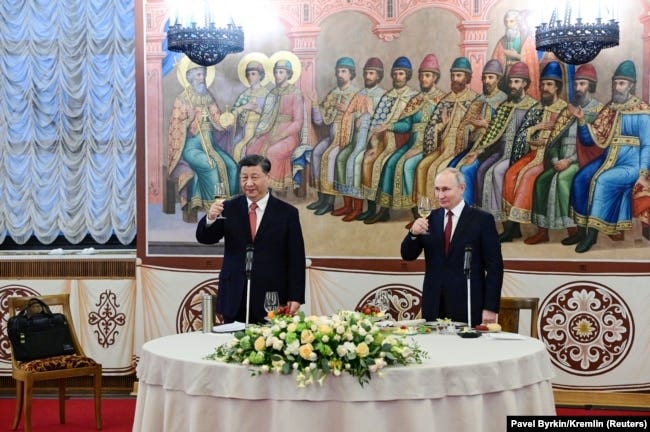Apr 5: Reid Standish, Brussels Looks For A New China Line
As published in the "China in Eurasia" newsletter on April 5, 2023
Reid Standish, Brussels Looks For A New China Line
From: China in Eurasia, RadioFreeEurope/RadioLiberty
European Commission President Ursula von der Leyen outlined her vision for the future of EU-China relations during a high-profile speech in Brussels on March 30. Read von der Leyen’s full comments here, but I've selected a few noteworthy passages:
"Far from being put off by the atrocious and illegal invasion of Ukraine, President Xi is maintaining his 'no-limits friendship' with Putin. But there has been a change of dynamic in the relationship between China and Russia. It is clear from this visit that China sees Putin's weakness as a way to increase its leverage over Russia. And it is clear that the power balance in that relationship -- which for most of the last century favored Russia -- has now reversed.
"We have to be frank on this point. How China continues to interact with Putin's war will be a determining factor for EU-China relations going forward.
"I believe it is neither viable -- nor in Europe's interest -- to decouple from China. Our relations are not black or white -- and our response cannot be either. This is why we need to focus on de-risk -- not decouple.
"But I also want to say that nothing is inevitable in geopolitics. China is a fascinating and complex mix of history, progress and challenges. And it will define this century. But our story about how we relate to China is not yet fully written -- and it need not be a defensive one. We must collectively show that our democratic system, our values and our open economy can deliver prosperity and security for people."

Three More Stories From Eurasia
1. Macron In China
French President Emmanuel Macron arrived in Beijing on April 5 along with von der Leyen for a three-day visit as Europe tries to find a balance between its concerns over China's geopolitical moves and its economic ambitions for the country.
What You Need To Know: As I reported here, Macron is looking to add a more personal touch to his discussions with Xi as part of an ambitious diplomatic push to create distance between the Chinese leader and Russian President Vladimir Putin.
Speaking ahead of the visit to Beijing, Macron said his goal was to "try and involve China as much as possible to put pressure on Russia" on topics such as nuclear weapons, with aides saying Macron will try to gauge Xi's reaction to Russia's threat to host nuclear missiles in Belarus.
EU officials who spoke to RFE/RL said that expectations were low within the bloc for Macron's moves to work, but the diplomatic gambit is part of a long-standing fascination from the French president on the need for Europe to keep a distance between Beijing and Moscow.
More so, even with criticism within the bloc toward China rising, there is still a belief that Brussels will need to preserve some kind of functional relationship with Beijing in the future to tackle pressing issues.
2. Watching Taiwan
With tensions high with Beijing, U.S. House of Representatives Speaker Kevin McCarthy has confirmed that he will meet with Taiwanese President Tsai Ing-wen on April 5 as she returns from a tour of Taiwan's allies in Central America.
The Details: Ahead of the visit, China staged military drills in the East China Sea and has repeatedly warned against any official contact between the U.S. and Taiwanese authorities.
The meeting in California comes after some notable recent developments. On March 30, Marketa Pekarova Adamova, the speaker of the Czech parliament's lower house, finished a trip where she led a delegation of more than 150 business leaders and officials to Taiwan as part of Prague's growing outreach to Taipei.
While that visit was under way, former Taiwan President Ma Ying-jeou made a historic trip to China, where he called for people on both sides of the Taiwan Strait to work together for peace because "we are all Chinese."
The symbolism of Ma -- who served as president from 2008 to 2016 -- traveling to China is significant, and he drew protesters to the airport in Taipei, who saw his visit as a form of capitulation to Beijing.
In the run-up to Taiwan's presidential election in early 2024, the series of visits have thrown up a host of questions about how Taiwanese politics is dealing with China and with the United States -- the two most significant foreign factors for Taiwan's future.
3. Same Game, New Rules
The ripple effects of China and Russia moving closer together are already being felt around the world, and as I reported here, those changes are being felt strongly in Central Asia, especially after Xi's recent visit to Moscow.
What It Means: The Kremlin traditionally viewed Central Asia as its strategic backyard, but has been displaced by China as the premier economic force for the region's five countries. Moscow's war in Ukraine has also released geopolitical and economic shock waves and seen China's role in the region grow through diplomatic summits and new initiatives.
Following the Xi-Putin meeting in late March, Xi announced that he would host a summit with the other Central Asian leaders in May. While China has hosted virtual summits with the region before, it would be the first in-person gathering at the top-level.
But Central Asia's story does not -- and never really has -- fully fit with one of Chinese and Russian competition. While each side has their own interests, the region is one that represents major overlap for Beijing and Moscow, a trend that was reinforced in Xi and Putin's joint statement in Moscow, where they said they would work together "to support the countries of Central Asia in ensuring their sovereignty and national development" and safeguard them against so-called "color revolutions and external interference in the affairs of the region.



